#grimm reactions
Text
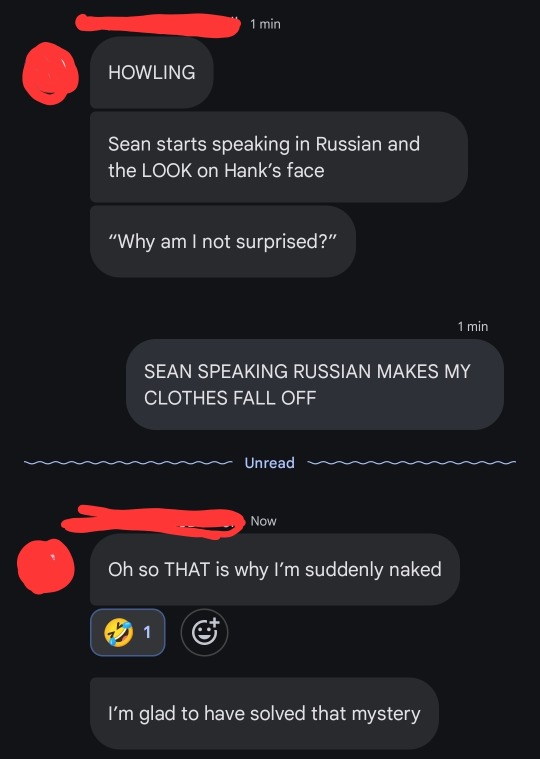
@thehomohomosapiensapien being a fucking mood lmao.
Sean Renard, making us all say "oh captain my captain" since 2011.
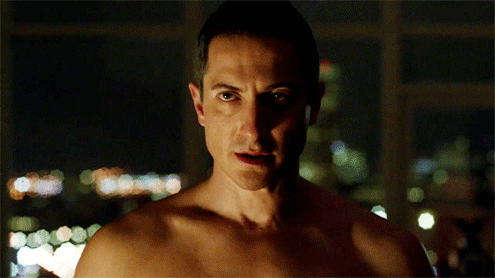
28 notes
·
View notes
Text
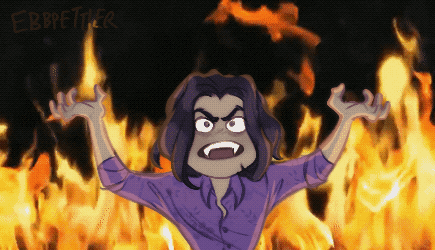
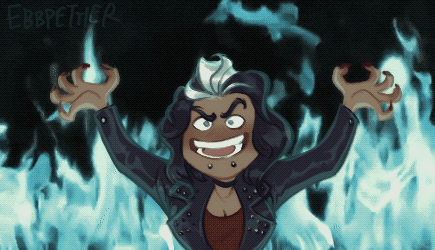
theirs is a very incendiary corner of the gene pool
#fiona pitch#baz pitch#carry on#tyrannus basilton grimm pitch#the pen is mightier#BLUE FIRE FIONA BECAUSE IT SUITS HER#her magic burns hotter than his does (because she's less flammable and also fundamentally angrier)#the fire elmo gif is my favorite reaction image can you tell >:D
492 notes
·
View notes
Text
Captain Renard, to Nick & Hank: “You know, my great great grandfather on my mother’s side was a big believer in rituals and sacrifices. That’s what got him burned at the stake.”
I love how he just randomly added this into casual conversation
#their reactions were so funny too like : dude why r u telling us this#grimm#sean renard#hank griffin#nick burkhardt#grimm s5e9#grimm nbc#nbc grimm
143 notes
·
View notes
Text


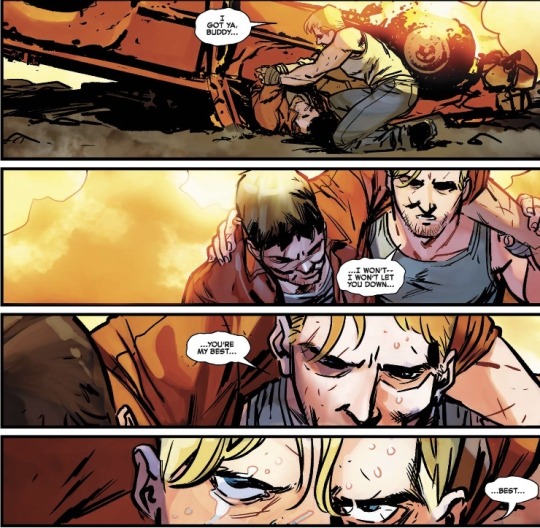


#blue speaks#ben grimm#johnny storm#fantastic four#who needs well thought out analysis when I can just post crying reaction pics instead#all of these are from the 2018 2-in-one run#I will be forwarding zdarsky my therapy bill
23 notes
·
View notes
Text
Rewatching grimm. Did nick just say he was in middle school drama club i
#i just found this in my drafts#grimm#nick burkhardt#i was astouded im not sure why but i had a visceral reaction#grimm nbc
31 notes
·
View notes
Note
Grimm and pk have definitely done the deed

🤨
46 notes
·
View notes
Text
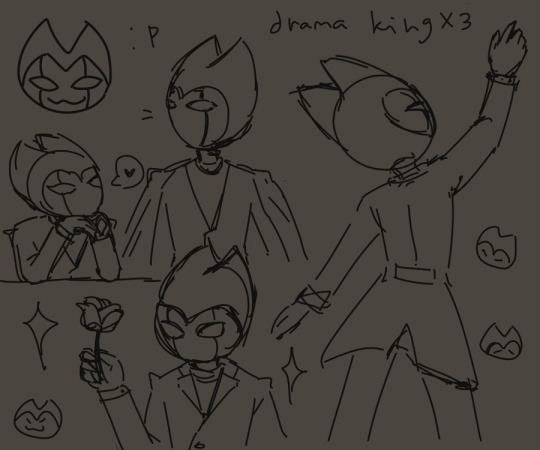
@alecz-obssesionz 's modern AU fanart yep <3
wanted to do grimm today and i think i FINALLY figured out how to draw his head omg. THAT MEANS MORE FANART YEEY!!!
now wait until i figure out how to draw Hollow and then you'll get some grollow arts
#hollow knight#hk fanart#hollow knight fanart#hk grimm#hollow knight grimmchild#troupe master grimm#desfan-art#ok now waiting for alecz's reaction#EHHEHEHEB IM SURE HE'LL LIKE THAT X3
19 notes
·
View notes
Note
MILTON GRIMM GOING FOR THE WILLIAM AFTON SPEEDRUN ANY% 🤞🤞🤞 RESPECTFULLY WHAT THE FUCK
this ask is so old but i think about it all the time i used 2 go into my inbox just 2 look at it and burst out laughing ...... ANY%.........
#RESPECTFULLY WHAT THE FUCK#it floors me to this DAY how intense everyones reaction was...#ask#eah#ever after high#gum rewrite#milton grimm#fave
13 notes
·
View notes
Text

In the end yuuji embraced nihilism but the negative type of nihilism the one that leaves you wondering "why shouldn't i just kill myself"
#understandable reaction when you take into account what he went through in the last hour#but this is such a grimm perspective on life and he's 15 it's sad#he should read nietzsche instead#iris reads jjk#jujutsu kaisen#jjk manga spoilers
11 notes
·
View notes
Text
A reaction to TV Tropes’ “Dead Unicorn Tropes”
TV Tropes and Idioms is a great site, and a bad website.
For dissecting fiction, identifying tropes, throwing little tidbits of cool info and fun trivia, it is a great site.
For actually teaching people real things about the world, or when it comes to its generalizations of genres and styles... it can be very bad.
I have this love-dislike relationship (not hate though) with TV Tropes because this site was so useful for me so many times I can’t imagine not living without it ; BUT I also noticed so much wrong things posted or written in pages because TV Tropes is not kept by actual experts and anyone can actually write anything in there - hopefully people double-check and hold the website together, but a lot of false, incomplete or biased information just slips by as it lacks Wikipedia’s stern neutral position.
And as I was scrolling through the pages I found the “Dead Unicorn Tropes” page. A page listing tropes that are basically “dead horse tropes” (that is to say over-used, over-parodied, over-played with, over-referenced tropes to the point they are seen as painfully cliche, greatly unfunny or dreadfully doll and boring owadays) - but with the twist that they are “unicorns”. Aka... while everyone treat these tropes as ancient, worn-out, over-used cliches, they never actually existed as “tropes” in the first place. They never were as popular and widespread as people believed - it is basically the Mandela Effect, but for popular culture.
For example many people think that James Bond wears a tuxedo all the time - when in truth he always just wore tuxedos for a few crucial scenes. But given they were among the most iconic and well-known scenes, popular culture developped the belief that James Bond was ALWAYS in a tuxedo. Or a lot of people parody romance animes by having the main protagonist running late for school with a toast in their mouth only to bump into someone... despite this scenario never being widespread or really used in the first place in animes of this genre.
Anyway... What caught my eye was a specific section of this page. A section dedicated to fairytales. And this being a fairytale blog... let’s react!
Fairy tales' supposed idealism and inevitable happy endings are commonly mocked and "deconstructed", most people being unaware that the real stories were often violent, cynical, and depressing. It's something of a Cyclic Trope, since the original stories had such a grim tone, before being bowdlerized and Disneyfied because Children Are Innocent (which is in itself an example of this trope), causing the stories to end up in an Animation Age Ghetto, which left them filled with Fridge Logic and other ripe fodder for deconstruction. On the other end of the spectrum, the belief that all fairy tales were originally gory grimdark horror stories before their Disneyfication is similarly exaggerated; the most common gratuitously violent passages that modern adaptations tend to leave out involve the deaths of the villains at the story's end. Grimmification as a trope is a rather ironic appellation, as The Brothers Grimm were in fact the Ur-Example of Disneyfication, with many of their stories being even darker before the Grimms retold them (but still not the nightmare gorefest people like to think).
I don’t have much to add to this section. The complicated thing with TV Tropes is that it mixes all fairytales together, not separating their origins, genres, cultural context - but what you can be sure about is that when they generalize “fairytales”, they actually talk of the “Western fairytales”, the specific chain of fairytales that went Italian-French-German.
It is true that the original Italian fairytales (well... they weren’t fairytales because the term fairytale was invented by the French, but these were proto-fairytales) were filled with sex, violence and grotesque elements - but that was because they were farcical humoristic stories, part of a long tradition of surreal bawdy slapstick tales inherited from medieval times, and they were entirely destined to adults.
The French fairytales were a “Disneyification” as TV Tropes says : because they became courtly tales told by nobles, aristocrats and intellectuals - it was the introduction of traditional fairytale princesses, of virtues and beauty winning over vice and ugliness, of delicate dialogues and scenes out of pastoral romances, etc... Perrault was the one who removed from Little Red Riding Hood the most gruesome details (such as how the wolf, according to some versions, leaves a bit of the blood and flesh of the grandmother for Little Red to eat). BUT on the flipside, French fairytales were FAR away from being Disney fairytales. They were “dark” as while they removed obvious sexuality they kept all the violence, from Bluebeard killing his wives in a chamber of blood to ogres eating their own children while being drunk one night. And while happy endings were very common, they weren’t a standard of fairytales: Charles Perrault’s Little Red Riding Hood ends with the girl being eaten by the Wolf, and that’s it - because it is a warning tale ; while Madame d’Aulnoy’s The Yellow Dwarf ends with the two lovers dying and becoming a couple of trees - due to the story being inspired by ancient myths.
As for the German fairytales, the work of the Brothers Grimm... On one side they do seem “darker” than the French fairytales due to trying to imitate/stay more faithful to the original folktales, and thus they include much less refinment, much less clear virtues and vices, much more bizarre, disturbing or murky elements... But nothing is too simple, as the Brothers Grimm also HEAVILY “Disneyified” fairytales - they cut down many tales from their book they deemed too “immoral” ; they added many happy endings (they invented the Woodsman saving Little Red Riding Hood) and they changed many dark elements (Snow-White’s stepmother was originally the girl’s mother).
Overall it is impossible to pin-point a specific “culprit” for making fairytales “lighter” or “darker” because each new incarnation of them has its own part of darkness and lightness... But TV Tropes might also evoke “fairytales” as in “literary fairytales VS folkloric fairytales” - opposing the fairytales written down by authors who actually tried to create a work of literature (all the fairytales talked about above are part of this category) to the actual “fairytales” told by common people, part of folklore and which inspired the literary fairytales. That is another often overlooked simplification: the fairytales we know are all literary works - inspired by folktales yes, but the same way you can have television shows, movies or podcasts inspired by folktales. And under this angle - yes, definitively, all the literary works put a “lighter” twist on the original tales of the common folk.
True Love's Kiss is not an original element to most fairy tales, but is rather a Disneyfication element. Many fairy tales' protagonists did indeed have The Big Damn Kiss, but it's not meant to be something especially powerful or magical, like a Deus ex Machina. Taking a survey of the most popular such kisses: in the Grimms' version of "Sleeping Beauty", the prince does awake the title character with a kiss, but that's just coincidence because he happened to be there when her hundred-year curse expired;note and in "Snow White", the prince never kisses Snow White, but instead drops her coffin and dislodged the chunk of poisoned apple stuck in her throat. The Ur-Example of the trope was in Norse Mythology, of the Valkyrie Brunhilda who was punished by Odin to sleep on a couch surrounded by fire and was awakened with a kiss from the hero Siegfried.
True! Well, almost... “true love kiss” was present in some French fairytales (as part of the “courtly love” angle - later taken back by the Grimms who wanted to make some tales “cleaner”), and fairytales do have magical kisses of various kinds, but 1) the term “true love kiss” was invented by Disney for its Snow-White movie and 2) the concept of a magical kiss has been taken out of proportions in fairytales. As the text points out: no versions of Snow-White, from the Grimms or from others, have the princess being woken up with a kiss - it was a Disney invention. But given Disney’s two most prominent and famous fairy-tale adaptations (Snow-White and Sleeping Beauty) used the “true love kiss” resolution, people learning of fairytales through Disney thought it was a traditional ending - and Disney’s capitalizing on it did ot help.
I will also add that while the Grimms’ use of the “magical love kiss” might have been influenced by the Germanic myth of Siegfried (after all the Grimms heavily studied and reconstructed Germanic mythology) ; the “magical love kiss” of French fairytales was obviously taken rather from Greco-Roman sources, more precisely from the tale of “Psyche and Cupid”, THE first proto-fairytale.
The Knight in Shining Armor rescuing the Damsel in Distress from a dragon is commonly associated with fairy tales, but this is rather rare; The Brothers Grimm only used it twice.
Kind-of-true too. Dragons are NOT typical or traditional fairytale villains - except maybe in folktales and rural legends. Similarly, male heroes in fairytales are rarely knights - they are mostly princes/nobles or peasants of some sort - sometimes a soldier, but that’s all. In fact, beyond the rare Brothers Grimm example cited above, the only other manifestations of this scenario appear in French fairytales, which loved to have a noble male hero save a damsel from some sort of monster - but dragons weren’t more popular than giants or wicked sorcerers, and the male hero rarely was a “knight” and rather a warrior-prince or fighting king.
The Unicorn (natch) is even more rare. If you do catch one, it won't be the delicate and pure creature like the modern trope, but the fierce and dangerous version of actual medieval legend.
True, because unicorns do not belong to the world of fairytales, but to the world of legends! I never saw one “original” fairytale, literary or otherwise, using a unicorn. Unicorns were part of medieval bestiaries and legends, and as thus were then reused in works of the “fantasy” genre in modern days - and then fantasy “bled” and got a bit confused with fairytales, and unicorns hoped into the “modern fairytale” conception... But yeah, unicorns in fairytales are basically completely unseen.
The Fairy Godmother is extremely rare and appears to have been introduced from literary variants. Sleeping Beauty is often just the victim of a prophesied fate. Cinderella is generally helped by her dead mother in some way, or by some magical beings whose good will she's earned. Even when she appears, it's not that "fairy godmother" is a type of supernatural being akin to a "guardian angel", but rather that a character's godmother, someone everyone in medieval Christendom would have and would already know as a close family friend, is unexpectedly revealed to be a fairy in disguise.
Ah... “Literary variants”. Now that’s a very interesting thing. You know, for a very long time the critics, the teachers, the ones studying fairytales, had this approach: look for folklore, rural legends, the “folktales” first, then look at the literary fairytales later and compare the two, seeing literary fairytales as “reimaginations” of the “original” tales. Nowaday, people in universities, and experts of literature, and critics, recognize that this approach is false and outdated - thanks to the research proving that most of the “folktales” we claim were the “original” sources... actually are just rural twins or doubles of the literary fairytales, which became so popular they spread to the lower classes. And fairytale history nowadays begins with the literary fairytales first - heck, the very term “fairy tale” was invented to designate the literary tales. Fairytales was originally a literary genre - and the term was only later broadened to include “folktales” in it (resulting in many mythological legends or religious tales being often incoherently called “fairytales”).
That being said... “The Fairy Godmother is very rare”. Oh boy... you feel whoever wrote this only knows of German fairytales, aka the Grimms’ work. Fairy godmothers are EVERYWHERE in the French fairytales. Why do you think the genre was called “fairy tale”? BECAUSE THERE WERE FRIGGIN FAIRIES EVERYWHERE!!! What’s even funnier is that the whole idea of “The Fairy Godmother protects the heroine” was invented by Grimms and Disney. A lot of fairytales in Madame d’Aulnoy’s books are actually persecuted by the fairy godmothers of the story’s villains, or of their rivals! Sometimes you even have battles of fairy godmothers!
Fairies themselves. Almost any conversation involving them will bring up that in the original tales fairies weren't good or helpful but were supposedly all represented by the most sinister interpretations of The Fair Folk. In reality fairies in the old tales and mythology tend to run the whole gamut from being good and/or helpful to being downright vicious. In many tales the behaviour of the same fairy type or fairy character can vary wildly depending on how a human interacts with them (usually courteous and virtuous behaviour will be rewarded, while vanity and other character flaws will be punished)
On top of what I said above, the article of TV Tropes here also keeps practicing a big confusion between several types of fairytales.
Fairies are actually pretty much absent from the fairytales of the Brother Grimms, who rather leave place for either magical dwarfs and imps, either witches, and sometimes supernatural ladies such as Frau Höle. The fairies REALLY come from the French fairytales - again, I have to insist, the very term “fairy tale” (conte de fées) was invented to talk about the works of Perrault and d’Aulnoy. And fairies in French fairytales were far from the “all good, kind and cute” fairies - again, this is Disney’s work (and actually it is also the work of Victorian literature, but that’s another subject). In French fairytales you have both good fairies and wicked fairies - though most of the time they are clearly divided by a manicheism of “good, kind, beautiful, benevolent fairies” VS “ugly, monstrous, old evil fairy”. However, some fairytales (such as those of Aulnoy) still blurred the line between the two as good fairies could be easily offended and thus do wicked things.
But here TV Tropes again refers mostly to “folktales” VS “literary tales” - and of course in “folktales” fairies are wildly different from their literary counterpart... Though even there is yet again another layer of confusion (so many...), because the French “fées” are NOT the English “fairies” even though they do translate by the same word. In English “fairies” originally designates a lot of inhabitants of the Otherworld ranging from pixies to monsters: in French “une fée” is originally a supernatural lady of the Otherworld, a cross between a goddess and a druidess/priestess, halfway between a nymph and sorceress.
#fairytales#fairy tales#french fairytales#german fairytales#charles perrault#brothers grimm#tv tropes and idioms#reaction post#madame d'aulnoy#fairy godmother#fairy godmothers#italian fairytales#true love kiss
29 notes
·
View notes
Text
Y'all I received an absolute NOVEL of Grimm season 3 reactions from @thehomohomosapiensapien today. 🤣 It's his first watch and he was NOT PREPARED for seasoj 3's unhinged energy.
My favorites under the cut:

None of us have ever been prepared for David Giuntoli's naked chest tbh.

MONROSALEE CUTENESS LEVEL MAXIMUM THIS SEASON.

I remember the tension of this episode ALL TOO WELL.

YAAAAY MY FAVORITE EP. I love this ep so much I love the little mini love story so much. I wish we got to see them again.
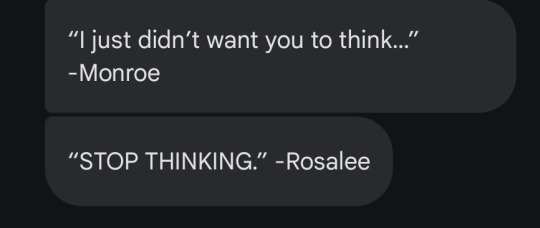
*snort*
SO REAL. Nick's stoneform is so unnerving. Welcome to Grimm Lore! Whatever doesn't kill him LITERALLY ACTUALLY makes him stronger!
(Seriously season 3 Nick is terrifyingly overpowered. Dude has superhearing and doesn't even need to BREATHE sometimes. He's really on track to be some kinda dark fairytale Superman!)

I see your edited sir. What filthy thing did you self-censor? 😂 No but seriously, there is NO DAMN REASON for Meisner to be so hot. NONE.
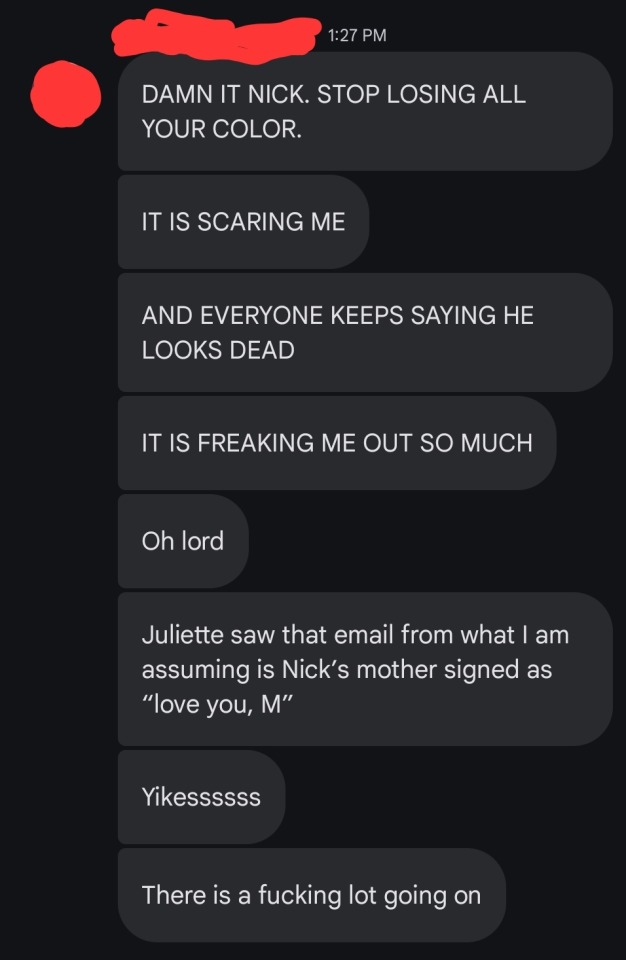

I LOVE EL CUCUY. I love that episode.
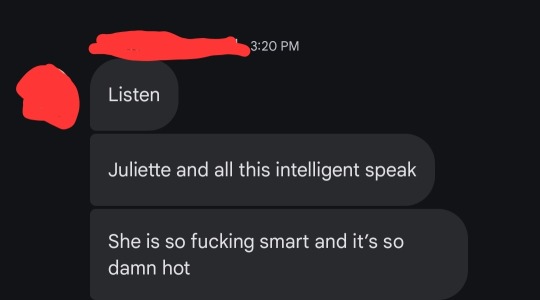
SO TRUE BESTIE. Juliette is so smart and badass, literally cannot love her more if I tried.
16 notes
·
View notes
Text
4.2 Octopus Head
okay so i finally got the guts to start s4. My thoughts from the first two episodes:
Monroe and Rosalee skipping their honeymoon because theyre worried about nick was so sweet
look,,, ive been supportive of juliette so far but girl it is NOT your call to decide whether or not Nick gets his grimm powers back!! what the fuck!! also he was LITERALLY SA'd so maybe have some compassion??? Hank seems to be the only one who is like 'hey thats fucked up its not your fault'
I continue to love Trubel dearly
THE INTERACTION WITH NICK HANK AND RENARD AT THE HOSPITAL WAS VERY FUNNY
"this is my mother." "... oh."
the headache scene at the end was very whumpy and delightful (david giuntoli makes very pretty distressed noises im sorry)
can we please tell Wu what is going on already this poor guy is having A TIME
please tell me someone noticed trubel getting kidnapped in the middle of a fuckin suburban street in broad daylight
#im really uncomfy with juliettes reaction#like that is LITERALLY assault#please be concerned for your bfs wellbeing#grimm liveblog
4 notes
·
View notes
Text
Me and my mutuals when we see the script for Volume 10:

#rwde#cannot believe yang has more of an fearful reaction to her sister shooting at a grimm and being sent flying#(by her weapon's recoil not even the grimm itself)#then she does watching her sister commit what is basically suicide in front of her#this is from a sneak peek for the new justice league crossover movie
2 notes
·
View notes
Text
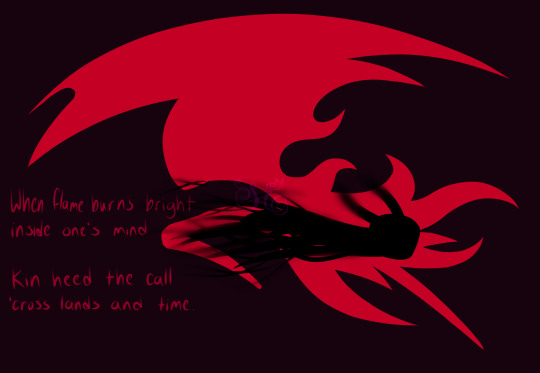
"Dance with me, friend. The crowd awaits."
(7 May 2022)
#love grimm's fight sm#shoutout to the redditor whose tip was to choreograph reactions#like a real dance with cues#10/10#(one day i'll figure out tumblr tags i promise)#hollow knight#art#spring 2022#digital
30 notes
·
View notes
Text
@icybreaths
icybreaths asked:
“I’d appreciate it if ya wouldn’t distract me. Don’t you have anything better ta do?” >o> [for Grimmjow]

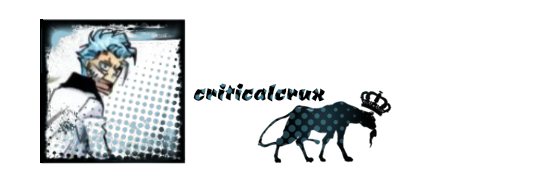
"Yer the one who trailed after me!"
#icybreaths#Unprompted ask: always accepting#muse!grimmjow#grimmjow vc: tha f'n nerve!#[[Both mun and muse had a huge laugh over this appearing in the ask box xD the timing was too perfect! nailed it]]#[[bless kubo for making this reaction/expression for Grimm canon]]
6 notes
·
View notes
Note

I made you something
Anywho, I imagine Grimm running into pkrad and being like “wtf”
YEAHHHH this FUCKS
#HAHA god i didnt even think about grimms reaction to them#chaotic#i like the neck piece on the design!!! very cool. and the pk-like robes lesgooo#oh and i LOVE the daggers im still undecided as to what weapon to give them... a morning star sounds cool but i want them to STAB#infected pale king au#ask#false king au#other's art
37 notes
·
View notes